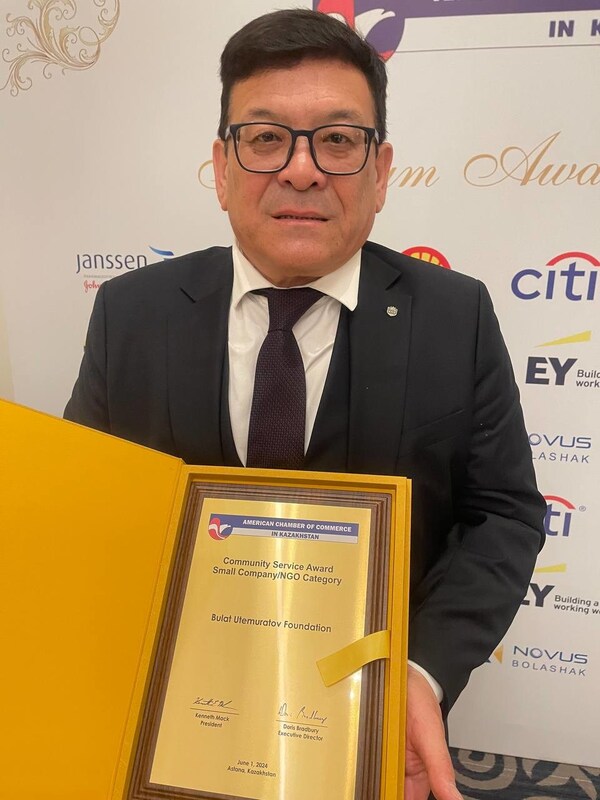Opinion: Central Asia is ready for philanthropy
Although NGOs and philanthropic initiatives are burgeoning in the region, Central Asian governments can do more to develop legal infrastructure needed to facilitate giving.
By Marat Aitmagambetov // 26 June 2024

During its three decades of independence, Kazakhstan has seen the number of registered NGOs grow from 5,000 around 15 years ago to over 23,000. Photo by: Andriej Szypilow / Alamy
The rural Kazakh tradition of asar, where a community comes together to help an individual with large tasks,can be considered an ancient form of volunteering in Central Asia. Throughout its history, Kazakhstan has developed customs to alleviate the harsh conditions of life on the steppe. Now, Central Asia is gradually experiencing the rebirth of philanthropy.
For decades, the region had broken away from its civic-led tradition of philanthropic giving. During the Soviet era, the ultimate responsibility for social welfare belonged to the state. Citizens were dependent on the government for their needs, and, as a result, after the collapse of the Soviet Union, philanthropy was neither understood nor trusted. This is changing slowly. In recent years, there has been a visible shift, as citizens and entrepreneurs begin to recognize the importance of philanthropy to fill gaps left by the state or business.
When the Bulat Utemuratov Foundation was established in 2014, the founder’s vision was that the initiatives undertaken by the foundation should not duplicate other projects. We identified problems that nobody was dealing with at the time and sought to find effective ways to solve them and then share our solutions with both society and the government.
This is how we focused on opening autism centers. The understanding of autism not as a disease but, rather, as a condition and the notion that autistic people can lead fulfilling lives was unheard of a few years ago in Kazakhstan. We’ve opened 13 autism centers that provide early intervention services at no cost in 12 cities, changing the perceptions of autism across the country and creating an effective support system for children and their families.
We’re not alone in our efforts. During its three decades of independence, Kazakhstan has seen the number of registered NGOs grow from 5,000 around 15 years ago to over 23,000, some 18,000 of which are currently active. The state is gradually catching up with civil society as well. In 2015, Kazakhstan adopted a law on charity for the first time in its history.
How the state can come in to play
The Kazakh government can still do more to encourage philanthropic activity, such as amending the current legislative framework. It remains significantly more difficult to establish a nonprofit organization than to register a commercial one. It might take over a month to register a nonprofit, while it could take just under a day to register an individual entrepreneur.
The government can also provide tax incentives for philanthropic giving, not only for businesses but for citizens as well. The 1% tax law in Hungary, for example, stipulates that citizens can choose to dedicate 1% of the tax they pay to any cause or institution of their choice that benefits society, such as a school, hospital, nongovernmental organization, etc. This not only encourages giving but also increases the transparency of, and thereby trust in, philanthropy.
Central Asian countries have a huge incentive at the moment to provide the legal infrastructure needed to facilitate giving. The region is quickly developing in terms of its economy and human capital. The economies of both Kazakhstan and Uzbekistan are set to grow by 5% or more in 2024, according to the European Bank for Reconstruction and Development. More importantly, Central Asia boasts one of the youngest populations in the world, with the average age being 27.6 years old.
The younger generation is unlike my own, which was brought up with a reliance on the state. Central Asian youth think differently and see the world differently. Many of them have studied and worked in Europe or the United States and have first-hand experience with effective philanthropy. They will be the catalysts for change, but it is still the task of the older generation to provide them with opportunities to learn, clear the path for them to bring their ideas to life, and contribute to the development of a mature civil society.
That’s another reason why, at the Bulat Utemuratov Foundation, we are investing in youth. For instance, we’ve spotted deficits in the public school curriculum and provide free programs for students to learn soft skills and entrepreneurship. We also built a school in the town of Kosshy which we handed over to the state and are now building a community center in the same area, which has never been done before in Kazakhstan. This type of local philanthropy not only invests in the younger generation but also makes philanthropy’s positive impact visible for all to see, therefore increasing societal trust and engagement.
Kazakhstan is the leader in the region when it comes to the scale of financing and philanthropic infrastructure. Our aim now is to encourage regional cooperation with neighboring countries. With its young population, growing economy, and new entrepreneurial class, Central Asia has all the resources needed to create a blossoming philanthropic sphere that can extend beyond borders.
But we still need guidance to improve our legal infrastructure, as well as country-to-county and society-to-state dialogue to identify problems and understand that it is in our hands, and nobody else’s, to solve them.
Editor’s note: The views in this opinion piece do not necessarily reflect the views of the Bulat Utemuratov Foundation.
SOURCE: www.devex.com/news/opinion-central-asia-is-ready-for-philanthropy-107779

